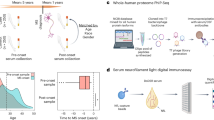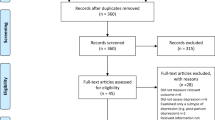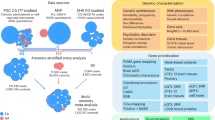Key Points
-
Pregnancies in women with MS are normal pregnancies: the disease itself does not pose a particular risk to the fetus
-
Relapses decrease during pregnancy, but rebound in the first 3 months postpartum, with an overall neutral effect in terms of relapses and disability in the pregnancy year
-
Epidural analgesia and breastfeeding are possible in women with MS
-
Disease-modifying treatments might be harmful to the fetus, and discontinuation before conception may be warranted; however, stopping treatment might be harmful to the mother
-
There is currently no treatment to prevent post-partum relapses
-
Pregnancy is possible in neuromyelitis optica; considering the potential severity of any attack and the high risk of a postpartum relapse to the mother, maintenance of immunoactive treatment should be discussed
Abstract
The influence of pregnancy on the course of multiple sclerosis (MS) has long been controversial; until the end of 1990s, women with MS were discouraged from having children owing to a biased belief that pregnancy would worsen the disease course. Since the first large prospective study in 1998, counselling of women with MS has changed radically, and many patients have attained their desire of motherhood. Although many disease-modifying drugs have come to market in the past two decades, when used during pregnancy and lactation, their beneficial effects on the course of MS have to be balanced with fears concerning potential risks to the fetus or child. The wealth of treatment options and the various associated risks have created a growing need for counselling on family planning for women with MS. Most importantly, such counselling should address the concerns that women with MS might have regarding pregnancy. Second, as soon as a woman starts considering pregnancy, a treatment plan should be established. This plan needs to weigh the risk posed to the fetus by potentially harmful drug exposure, and the risk to the mother from a reappearance of disease activity. Finally, breastfeeding and treatment options after delivery should be discussed to outline the options for prevention of postpartum relapses, and the possible resumption of disease-modifying drugs.
This is a preview of subscription content, access via your institution
Access options
Subscribe to this journal
Receive 12 print issues and online access
$209.00 per year
only $17.42 per issue
Buy this article
- Purchase on Springer Link
- Instant access to full article PDF
Prices may be subject to local taxes which are calculated during checkout


Similar content being viewed by others
References
Confavreux, C., Hutchinson, M., Hours, M. M., Cortinovis-Tourniaire, P. & Moreau, T. Rate of pregnancy-related relapse in multiple sclerosis. N. Engl. J. Med. 339, 285–291 (1998).
Vukusic, S. et al. Pregnancy and multiple sclerosis (the PRIMS study): clinical predictors of post-partum relapse. Brain 127, 1353–1360 (2004).
Salemi, G. et al. The relapse rate of multiple sclerosis changes during pregnancy: a cohort study. Acta Neurol. Scand. 110, 23–26 (2004).
Portaccio, E. et al. Breastfeeding is not related to postpartum relapses in multiple sclerosis. Neurology 77, 145–150 (2011).
Finkelsztejn, A., Brooks, J. B., Paschoal, F. M. & Fragoso, Y. D. What can we really tell women with multiple sclerosis regarding pregnancy? A systematic review and meta-analysis of the literature. BJOG 118, 790–797 (2011).
Hellwig, K., Haghikia, A., Rockhoff, M. & Gold, R. Multiple sclerosis and pregnancy: experience from a nationwide database in Germany. Ther. Adv. Neurol. Disord. 5, 247–253 (2012).
Hughes, S. E. et al. Predictors and dynamics of post-partum relapses in women with multiple sclerosis. Mult. Scler. 20, 739–746 (2014).
Saraste, M. H., Kurki, T. & Airas, L. M. Postpartum activation of multiple sclerosis: MRI imaging and immunological characterization of a case. Eur. J. Neurol. 13, 93–102 (2006).
Paavilainen, T. et al. Magnetic resonance imaging of the brain used to detect early post-partum activation of multiple sclerosis. Eur. J. Neurol. 14, 1216–1221 (2007).
Fragoso, Y. D. et al. The effects of long-term exposure to disease-modifying drugs during pregnancy in multiple sclerosis. Clin. Neurol. Neurosurgery 115, 154–159 (2012).
D'hooghe, M. B., Nagels, G. & Uitdehaag, B. M. Long-term effects of childbirth in MS. J. Neurol. Neurosurg. Psychiatry 81, 38–41 (2010).
Miller, D. H., Fazekas, F., Montalban, X., Reingold, S. C. & Trojano, M. Pregnancy, sex and hormonal factors in multiple sclerosis. Mult. Scler. 20, 527–536 (2014).
Drake, E., Drake, M., Bird, J. & Russell, R. Obstetric regional blocks for women with multiple sclerosis: a survey of UK experience. Int. J. Obstet. Anesth. 15, 115–123 (2006).
Pasto, L. et al. for the MS Study Group of the Italian Neurological Society. Epidural analgesia and cesarean delivery in multiple sclerosis post-partum relapses: the Italian cohort study. BMC Neurol. 12, 165–171 (2012).
Lu, E. et al. Obstetrical epidural and spinal anesthesia in multiple sclerosis. J. Neurol. 260, 2620–2628 (2013).
World Health Organization. Infant and young child nutrition. Global strategy on infant and young child feeding [online], (2002).
Langer-Gould, A. & Hellwig, K. One can prevent post-partum MS relapses by exclusive breastfeeding: yes. Mult. Scler. 19, 1567–1568 (2013).
Vukusic, S., Confavreux, C. One can prevent post-partum MS relapses by exclusive breastfeeding: no. Mult. Scler. 19, 1565–1566 (2013).
Hutchinson, M. One can prevent post-partum MS relapses by exclusive breast feeding: commentary. Mult. Scler. 19, 1569–1570 (2013).
Whitaker, J. N. Effects of pregnancy and delivery on disease activity in multiple sclerosis. N. Engl. J. Med. 339, 339–340 (1998).
Langer-Gould, A. et al. Exclusive breastfeeding and the risk of postpartum relapses in women with multiple sclerosis. Arch. Neurol. 66, 958–963 (2009).
Airas, L., Jalkanen, A., Alanen, A., Pirttila, T. & Marttila, R. J. Breastfeeding, postpartum and prepregnancy disease activity in multiple sclerosis. Neurology 75, 474–476 (2010).
Neuteboom, R. F. & Hintzen, R. Q. Breastfeeding, postpartum and prepregnancy disease activity in multiple sclerosis. Neurology 76, 1532 (2011).
Pakpoor, J. et al. Breastfeeding and multiple sclerosis relapses: a meta-analysis. J. Neurol. 259, 2246–2248 (2012).
Kieseier, B. C. & Wiendl, H. Postpartum disease activity and breastfeeding in multiple sclerosis revisited. Neurology 75, 392–393 (2010).
Cavalla, P. et al. Fertility in patients with multiple sclerosis: current knowledge and future perspectives. Neurol. Sci. 27, 231–239 (2006).
Hellwig, K. & Correale, J. Artificial reproduction techniques in multiple sclerosis. Clin. Immunol. 149, 219–224 (2013).
Laplaud, D. A., Leray, E., Barriere, P., Wiertlewski, S. & Moreau, T. Increase in multiple sclerosis relapse rate following in vitro fertilization. Neurology 66, 1280–1281 (2006).
Hellwig, K. et al. Increased MS relapse rate during assisted reproduction technique. J. Neurol. 255, 592–593 (2008).
Hellwig, K., Schimrigk, S., Beste, C., Muller, T. & Gold, R. Increase in relapse rate during assisted reproduction technique in patients with multiple sclerosis. Eur. Neurol. 61, 65–68 (2009).
Michel, L. et al. on behalf of the Club Francophone de la Sclerose En Plaques (CFSEP). Increased risk of multiple sclerosis relapse after in vitro fertilization. J. Neurol. Neurosurg. Psychiatry 83, 796–802 (2012).
Correale, J., Farez, M. F. & Ysrraelit, M. C. Increase in multiple sclerosis activity after assisted reproduction technology. Ann. Neurol. 72, 682–694 (2012).
Food and Drug Administration, Department of Health and Human Services. Content and Format of Labeling for Human Prescription Drug and Biological Products; Requirements for Pregnancy and Lactation Labeling [online], (2008).
European Medicines Agency. Guideline on risk assessment of medicinal products on human reproduction and lactation: from data to labelling. [online], (2005).
Haghikia, A. et al. Natalizumab use during the third trimester of pregnancy. JAMA Neurol. 71, 891–895 (2014).
Miller, D. H. et al. for the International Natalizumab Multiple Sclerosis Trial Group. A controlled trial of natalizumab for relapsing multiple sclerosis. N. Engl. J. Med. 348, 15–23 (2003).
O'Connor, P. W. et al. Disease activity return during natalizumab treatment interruption in patients with multiple sclerosis. Neurology. 76, 1858–1865 (2011).
Killestein, J. et al. Natalizumab drug holiday in multiple sclerosis: poorly tolerated. Ann. Neurol. 68, 392–395 (2010).
Kerbrat, A. et al. Natalizumab and drug holiday in clinical practice: an observational study in very active relapsing remitting multiple sclerosis patients. J. Neurol. Sci. 308, 98–102 (2011).
Papeix, C., Depaz, R., Tourbah, A., Stankoff, B. & Lubetzki, C. Dramatic worsening following plasma exchange in severe post-natalizumab withdrawal multiple sclerosis relapse. Mult. Scler. 17, 1520–1522 (2011).
Martinelli, V. et al. Recurrent disease-activity rebound in a patient with multiple sclerosis after natalizumab discontinuations for pregnancy planning. Mult. Scler. http://dx.doi.org/10.1177/1352458513492246.
Vukusic, S. et al. Natalizumab for the prevention of post-partum relapses in women with multiple sclerosis. Mult. Scler. http://dx.doi.org/10.1177/1352458514554056.
Sempere, A. P., Berenguer-Ruiz, L. & Feliu-Rey, E. Rebound of disease activity during pregnancy after withdrawal of fingolimod. Eur. J. Neurol. 20, e109–e110 (2013).
Park-Wyllie, L. Birth defects after maternal exposure to corticosteroids: prospective cohort study and meta-analysis of epidemiological studies. Teratology 62, 385–392 (2000).
Carmichael, S. L. et al. for the National Birth Defects Prevention Study. Maternal corticosteroid use and orofacial clefts. Am. J. Obstet. Gynecol. 197, 585.e1–585.e7 (2007).
Hviid, A. & Molgaard-Nielsen, D. Corticosteroid use during pregnancy and risk of orofacial clefts. CMAJ 183, 796–804 (2011).
Bjorn, A. M., Nielsen, R. B., Norgaard, M., Nohr, E. A. & Ehrenstein, V. Risk of miscarriage among users of corticosteroid hormones: a population-based nested case-control study. Clin. Epidemiol. 5, 287–294 (2013).
Achiron, A. et al. Effect of intravenous immunoglobulin treatment on pregnancy and post-partum related relapses in multiple sclerosis. J. Neurol. 251, 1133–1137 (2004).
Confavreux, C. Intravenous immunoglobulins, pregnancy and multiple sclerosis. J. Neurol. 251, 1138–1139 (2004).
Haas, J. & Hommes, O. R. A dose comparison study of IVIG in postpartum relapsing-remitting multiple sclerosis. Mult. Scler. 13, 900–908 (2007).
Hellwig, K., Beste, C., Schimrigk, S. & Chan, A. Immunomodulation and postpartum relapses in patients with multiple sclerosis. Ther. Adv. Neurol. Disord. 2, 7–11 (2009).
Fragoso, Y. D. et al. Postpartum treatment with immunoglobulin does not prevent relapses of multiple sclerosis in the mother. Health Care Women Int. 3, 1–9 (2014).
De Sèze, J. et al. Intravenous corticosteroids in the postpartum period for reduction of acute exacerbations in multiple sclerosis. Mult. Scler. 10, 596–597 (2004).
Sicotte, N. L. et al. Treatment of multiple sclerosis with the pregnancy hormone estriol. Ann. Neurol. 52, 421–428 (2002).
Vukusic, S. et al. The prevention of post-partum relapses with progestin and estradiol in multiple sclerosis (POPART'MUS) trial: rationale, objectives and state of advancement. J. Neurol. Sci. 286, 114–118 (2009).
Cree, B. A. C. Update on reproductive safety of current and emerging disease-modifying therapies for multiple sclerosis. Mult. Scler. 19, 835–843 (2013).
Wingerchuk, D. et al. The spectrum of neuromyelitis optica. Lancet Neurol. 6, 805–815 (2007).
Bourre, B. et al. Neuromyelitis optica and pregnancy. Neurology 78, 875–879 (2012).
Kim, W. et al. Influence of pregnancy on neuromyelitis optica spectrum disorder. Neurology 78, 1264–1267 (2012).
Fragoso, Y. D. et al. Neuromyelitis optica and pregnancy. J. Neurol. 260, 2614–2619 (2013).
Sadana, N. et al. Anesthetic management of a parturient with neuromyelitis optica. Int. J. Obstet. Anesth. 21, 371–375 (2012).
Ritzenthaler, T. et al. First attack of Devic's neuromyelitis optica following endovascular treatment and rupture of brain arteriovenous malformation. Mult. Scler. 17, 895–896 (2011).
Saadoun, S. et al. Neuromyelitis optica IgG causes placental inflammation and fetal death. J. Immunol. 191, 2999–3005 (2013).
Asgari, N., Henriksen, T. B., Petersen, T., Lillevang, S. T. & Weinshenker, B. G. Pregnancy outcomes in a woman with neuromyelitis optica. Neurology 83, 1576–1577 (2014).
Kimbrough, D. J. et al. Treatment of neuromyelitis optica: review and recommendations. Mult. Scler. Relat. Disord. 1, 180–187 (2012).
Pellkofer, H. L. et al. Course of neuromyelitis optica during inadvertent pregnancy in a patient treated with rituximab. Mult. Scler. 15, 1006–1008 (2009).
Ringelstein, M. et al. Neuromyelitis optica and pregnancy during therapeutic B cell depletion: infant exposure to anti-AQP4 antibody and prevention of rebound relapses with low-dose rituximab postpartum. Mult. Scler. 19, 1544–1547 (2013).
Compston, A. & Coles, A. Multiple sclerosis. Lancet 359, 1221–1231 (2002).
Hale, T. W. et al. Transfer of interferon β-1a into human breastmilk. Breastfeed Med. 7, 123–125 (2012).
Multiple Sclerosis Trust UK. Pregnancy and parenthood fact sheet [online], (2014).
Author information
Authors and Affiliations
Contributions
The authors contributed equally to the article.
Corresponding author
Ethics declarations
Competing interests
S.V. has received consulting and lecture fees, travel grants and research support from Bayer-Schering, Biogen Idec, Genzyme, Novartis, Merck Serono, Sanofi Aventis and Teva Pharma. R.M. has received consulting and lecture fees, travel grants and research support from Bayer-Schering, Biogen Idec, Genzyme, Novartis, Merck Serono, Sanofi Aventis and Teva Pharma, and serves in the advisory board of MedImmune.
Supplementary information
Supplementary Table 1
Use of first-line, second-line and off-label disease-modifying treatment in pregnancy (DOC 92 kb)
Rights and permissions
About this article
Cite this article
Vukusic, S., Marignier, R. Multiple sclerosis and pregnancy in the 'treatment era'. Nat Rev Neurol 11, 280–289 (2015). https://doi.org/10.1038/nrneurol.2015.53
Published:
Issue Date:
DOI: https://doi.org/10.1038/nrneurol.2015.53
This article is cited by
-
Disease Reactivation after Fingolimod Discontinuation in Pregnant Multiple Sclerosis Patients
Neurotherapeutics (2021)
-
Early Aggressive Treatment Approaches for Multiple Sclerosis
Current Treatment Options in Neurology (2021)
-
The Impact of Reproductive Issues on Preferences of Women with Relapsing Multiple Sclerosis for Disease-Modifying Treatments
The Patient - Patient-Centered Outcomes Research (2020)
-
Schwangerschaft und multiple Sklerose
DGNeurologie (2019)
-
Relapses and obstetric outcomes in women with multiple sclerosis planning pregnancy
Journal of Neurology (2019)



